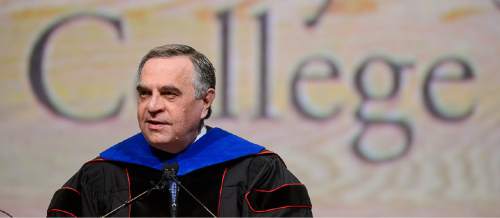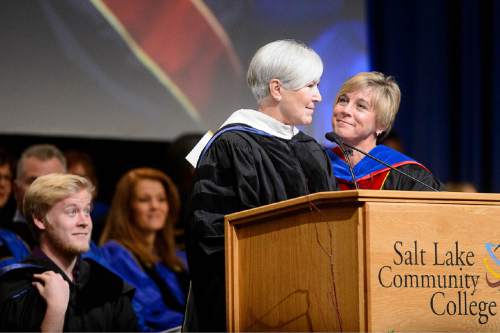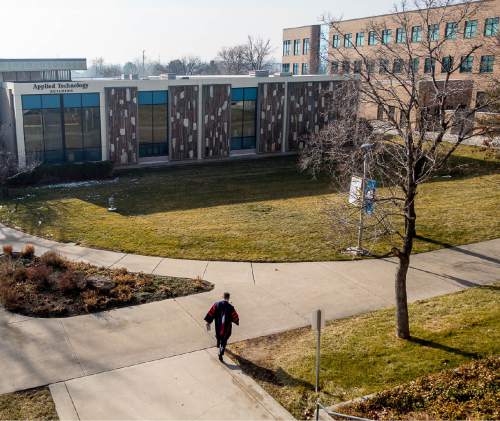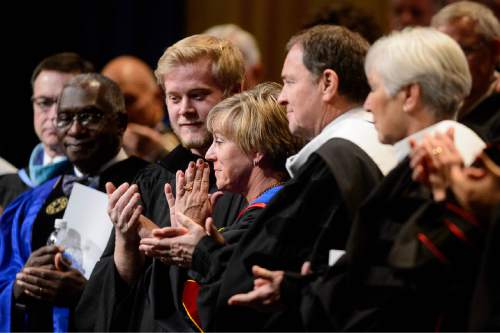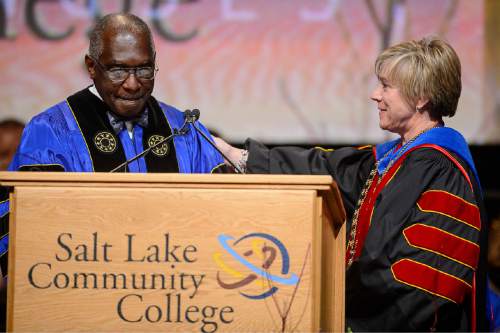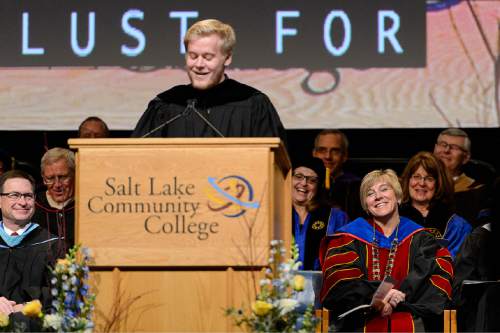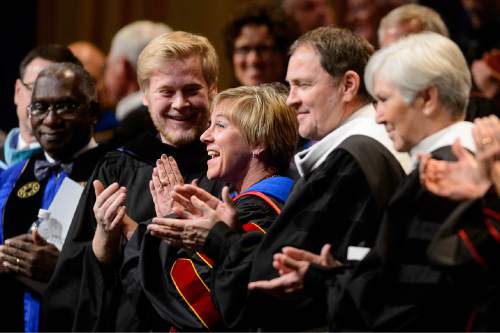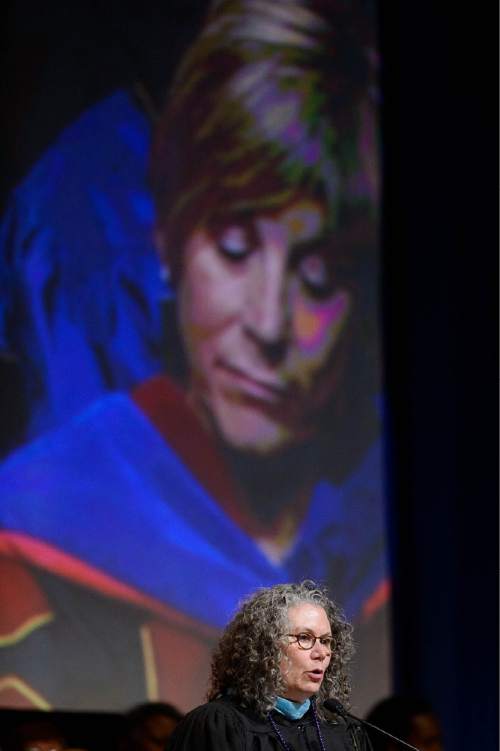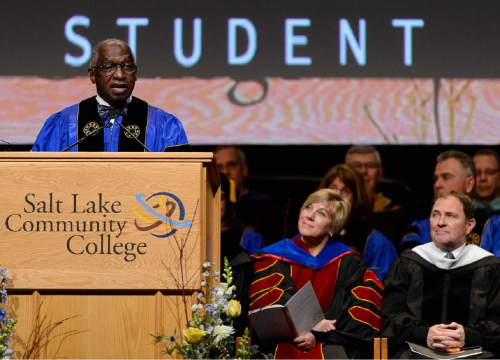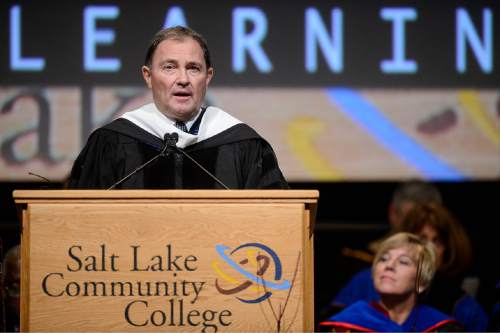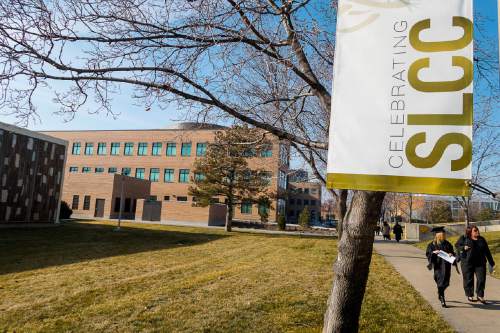This is an archived article that was published on sltrib.com in 2015, and information in the article may be outdated. It is provided only for personal research purposes and may not be reprinted.
Tuition payments might one day vanish from community college students' list of worries.
President Barack Obama announced a preliminary plan Friday to help millions of students nationwide — and thousands in Utah — receive a free two-year degree.
Some state officials cheered the spotlight on college education, but others said Utah needs more details before signing on.
Utah Gov. Gary Herbert was leery Friday, saying he's "concerned" that potential requirements could hamstring the state and its roughly 34,000 community college students.
Covering the cost of a two-year degree would be "money well spent in the long run," the Republican governor said. "The question is, how do you do it?"
The president's proposal would cover tuition for community college students who attend classes at least half-time, maintain a GPA of 2.5 or higher, and make "steady progress" toward a degree.
Federal officials estimate the program could help 9 million students nationwide. But it faces several hurdles and requires Congressional approval before states can decide to opt in. If they choose to participate, states would foot a quarter of the cost and the federal government would cover the remainder.
Nationally, 40 percent of college students attend community college. In Utah, the proportion shrinks to roughly one in five college students, the most recent enrollment figures show. It dips to about 16 percent when only full-time students are considered.
It's unclear how many Utah students would benefit if state officials sign on: Some Utah colleges, including Weber State University, Utah Valley University and Dixie State University, offer both two- and four-year programs.
Students working toward two-year degrees at those schools won't know if they'll qualify until the White House and Congress hammer out the specifics, said Utah Higher Education Commissioner David Buhler.
"Overall, it's a bit of a wait-and-see," he said. "You just need to know what the details are."
Buhler said he is happy that the national spotlight has turned to college education.
"Any conversation that encourages college attendance," improves access or helps lift the cost burden on students, he said, "is a very positive thing."
At Salt Lake Community College, Herbert was mulling the nitty-gritty, including how the federal money would be distributed. The governor spoke with reporters after an inauguration ceremony for incoming school President Deneece Huftalin.
The state should consider, Herbert said, whether students should continue to "earn their way" to a degree. Utah and federal officials should also study other options to drive down tuition fees, he said.
"Maybe we're better off trying to reduce tuition costs," he said.
Buhler hopes the Legislature will set aside enough higher education funding to keep tuition "very, very low."
The Board of Regents, which is the governing body of Utah's public colleges and universities, has asked for a 9.7 percent budget increase from legislators, which would raise statewide tuition by 2.5 percent. Herbert, by contrast, proposed about a 6 percent increase.
Huftalin, the incoming SLCC president, declined to comment on the proposal, said SLCC spokesman Joy Tlou. But, he said, college leaders are eager to learn more.
"We're interested in finding out what the details are, since it seems to fulfill our mission," he said of the proposal. "If it presents opportunities for students, great. If it presents difficulties, we're interested in examining that."
But Steven Hood, Snow College vice president for academic affairs, was more upbeat. He called the plan "a real boon" to students and praised the 2.5 GPA requirement as a good midpoint.
"Lots of times," he said, "families are under the belief that if my kid doesn't have a 3.0 or better, they're not gonna be able to go to college. And that's simply not the case."
At Snow College, Spanish-speaking students who aren't fluent in English often excel in math or science, but struggle in other courses requiring greater language skills: Their GPAs fail to reflect their drive and talent, Hood said.
He hopes that such a proposal would pass in the state Legislature. Lawmakers "understand that there's an accessibility problem. We have to make it accessible to students who can't pay out of pocket."
Pat Jones, the former Democratic state senator from Holladay, called the free tuition idea "exciting and intriguing," but said the proposal would likely face opposition. Many in Utah, she said, believe students should find their own ways to pay for a degree.
"In the olden days, that worked well," she said. "But it might be unrealistic in today's world" where many students graduate with crippling debt.
"We're asking and expecting and requiring our young people to have a degree or a certificate, but we have to give them a means to achieve that," she said. This might be a very effective way to do it."
Carlos Moreno, SLCC Student Association president and a political science major, said he hadn't conferred yet with other students about Obama's proposal. In his own view, "that's gonna be excellent," he said, "We have so many smart students who don't have the money to study." But the 32-year-old labor attorney from Venezuela added that he's also skeptical, citing what he calls the "disadvantages" of universal education in his home country: underpaid faculty, run-down classrooms and perennial students with no plans to graduate.
State officials should carefully weigh any decision on the proposal, he said. "We have to see what is the best thing for the students."



